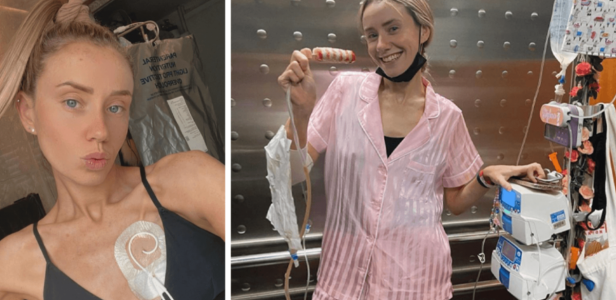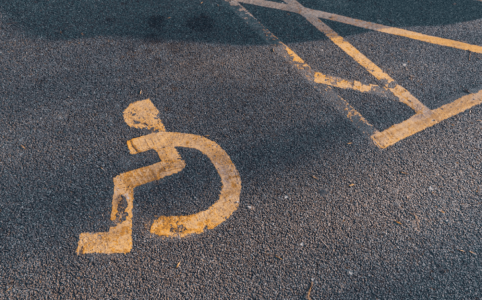Not all disabilities are visible: Woman shares heartbreaking story of harassment and abuse
- Replies 23
Our world can be an unforgiving place sometimes, especially for those who are dealing with 'invisible' illnesses. Stephanie Kelly, a 27-year-old from Sydney, is all too familiar with this reality.
Born with life-threatening heart conditions and a potassium-wasting disorder, Ms Kelly has been wheelchair-bound at times. In 2018, she was also involved in a major car crash that left her with a paralysed stomach and intestines, and she now relies on feeding tubes for 16 hours a day.
While it's not immediately obvious to strangers that Ms Kelly has a number of disabilities, she is entitled to and uses a disabled parking permit.
Despite this, though, she has faced countless instances of judgement, attacks, verbal abuse, and even car damage from strangers who cannot see her disabilities.

In one particularly alarming encounter, a group of teens decided to hurl a Macca's soft serve at her car simply because they couldn't believe she had a legitimate disabled parking permit.
Ms Kelly, who was just 27 years old at the time, was left feeling humiliated and frustrated that her disability wasn't taken seriously, despite her disability permit being clearly displayed on her dashboard.
'They went through the McDonald's drive-through, came back out and threw an entire soft serve cone onto our car,' she recalled.
'We never got to ask them why they did that. I wear clothes that cover everything (her medical devices) so I get that it looks like I'm not disabled and I'm parking there for convenience, but just ask me.'
Ms Kelly's story struck a chord with many readers who have faced similar situations. Commenters on her social media post shared their own harrowing encounters with strangers who refused to believe they had a disability, revealing the heartbreaking realities of living with a condition that isn't immediately visible to others.
One commenter shared a story about a friend in her early 20s who was battling cancer and parked in a disabled spot, only to be confronted by a stranger who complained about her parking there.
In a moment of frustration and anger, the friend ripped off her wig. This shocking incident highlights the desperation and pain that can come with having to constantly prove the validity of one's disability.
Another commenter shared their own experience of having a stranger stand in the middle of a parking bay and refuse to let their husband park, despite his legitimate disabled parking permit.
To 'prove' their disability, the commenter recalled being forced to come out of the car with their walking frame to assert their right to use the spot.
But amidst the pain and frustration, one commenter said they found a way around these situations.
Their husband had developed a strategy to manage these episodes by placing a sign on both sides of his rear door window that read, 'Yes I can park here, not all disabilities are visible.'
This simple but powerful message reminds us all that disabilities come in many different forms and that we must always treat each other with kindness and understanding.

In Australia, disabled parking spaces can be found outside of many commercial businesses, shopping centres, and public facilities. These parking spaces are specially designated bays where disabled people can more easily access the facilities they need.
In the case of Ms Kelly, her disabled parking permit allowed her to legally use the designated bay to access a pharmacy.
However, despite the fact that the presence of disabled parking spaces is in accordance with current laws and standards, people who use these bays are often subjected to ridicule and abuse by other members of the public.
These outdated views, which frequently forget that not all disabilities are visible, can have a devastating impact. It is for this reason that many states and territories in Australia have created legislation to protect disabled drivers from discrimination and abuse.
For example, in New South Wales, drivers who park illegally in confirmed accessible and disabled parking spots may attract significant fines, and offenders may also be reported to the local police station by people who are witnessing the abuse. Similar protective legislation is present in other parts of the country, including South Australia and Victoria.

Therefore, while disability parking spaces are an important part of any public facility, it is equally important to ensure that they are used legally and responsibly.
This can be achieved by increasing awareness around disability legislation and working to actively ensure that these laws are not violated by those who do not qualify to use these parking spaces.
Ms Kelly's powerful story serves as a critical reminder that disabilities come in many different forms, and not all of them are immediately visible to the naked eye. Her experiences with judgement, attacks, and verbal abuse for using a disabled parking spot show the need for greater awareness and understanding of the realities faced by those with disabilities.
We want to hear from you, members. Have you ever been wrongly judged for using a disabled space? Do you have your own experiences or stories to share? We encourage you to join the conversation and share your thoughts and feelings in the comments below.
Born with life-threatening heart conditions and a potassium-wasting disorder, Ms Kelly has been wheelchair-bound at times. In 2018, she was also involved in a major car crash that left her with a paralysed stomach and intestines, and she now relies on feeding tubes for 16 hours a day.
While it's not immediately obvious to strangers that Ms Kelly has a number of disabilities, she is entitled to and uses a disabled parking permit.
Despite this, though, she has faced countless instances of judgement, attacks, verbal abuse, and even car damage from strangers who cannot see her disabilities.

Stephanie Kelly, a 27-year-old woman from Sydney, is all too familiar with the problems associated with having an 'invisible illness'. Credit: Instagram/stephkkelly.
In one particularly alarming encounter, a group of teens decided to hurl a Macca's soft serve at her car simply because they couldn't believe she had a legitimate disabled parking permit.
Ms Kelly, who was just 27 years old at the time, was left feeling humiliated and frustrated that her disability wasn't taken seriously, despite her disability permit being clearly displayed on her dashboard.
'They went through the McDonald's drive-through, came back out and threw an entire soft serve cone onto our car,' she recalled.
'We never got to ask them why they did that. I wear clothes that cover everything (her medical devices) so I get that it looks like I'm not disabled and I'm parking there for convenience, but just ask me.'
Ms Kelly's story struck a chord with many readers who have faced similar situations. Commenters on her social media post shared their own harrowing encounters with strangers who refused to believe they had a disability, revealing the heartbreaking realities of living with a condition that isn't immediately visible to others.
One commenter shared a story about a friend in her early 20s who was battling cancer and parked in a disabled spot, only to be confronted by a stranger who complained about her parking there.
In a moment of frustration and anger, the friend ripped off her wig. This shocking incident highlights the desperation and pain that can come with having to constantly prove the validity of one's disability.
Another commenter shared their own experience of having a stranger stand in the middle of a parking bay and refuse to let their husband park, despite his legitimate disabled parking permit.
To 'prove' their disability, the commenter recalled being forced to come out of the car with their walking frame to assert their right to use the spot.
But amidst the pain and frustration, one commenter said they found a way around these situations.
Their husband had developed a strategy to manage these episodes by placing a sign on both sides of his rear door window that read, 'Yes I can park here, not all disabilities are visible.'
This simple but powerful message reminds us all that disabilities come in many different forms and that we must always treat each other with kindness and understanding.
Key Takeaways
- A young woman with multiple disabilities experienced a shocking confrontation after parking in a disabled car space.
- A group of vigilante girls threw ice cream at her car for parking in the disabled spot.
- Other commenters shared similar stories, with some even having to go as far as displaying signs on their cars just to 'prove' their disabilities.
In the case of Ms Kelly, her disabled parking permit allowed her to legally use the designated bay to access a pharmacy.
However, despite the fact that the presence of disabled parking spaces is in accordance with current laws and standards, people who use these bays are often subjected to ridicule and abuse by other members of the public.
These outdated views, which frequently forget that not all disabilities are visible, can have a devastating impact. It is for this reason that many states and territories in Australia have created legislation to protect disabled drivers from discrimination and abuse.
For example, in New South Wales, drivers who park illegally in confirmed accessible and disabled parking spots may attract significant fines, and offenders may also be reported to the local police station by people who are witnessing the abuse. Similar protective legislation is present in other parts of the country, including South Australia and Victoria.

The disability parking permit (DPP) allows holders to park in parking bays showing the international symbol of access. Credit: Pexels/Jakub Pabis.
Therefore, while disability parking spaces are an important part of any public facility, it is equally important to ensure that they are used legally and responsibly.
This can be achieved by increasing awareness around disability legislation and working to actively ensure that these laws are not violated by those who do not qualify to use these parking spaces.
Ms Kelly's powerful story serves as a critical reminder that disabilities come in many different forms, and not all of them are immediately visible to the naked eye. Her experiences with judgement, attacks, and verbal abuse for using a disabled parking spot show the need for greater awareness and understanding of the realities faced by those with disabilities.
We want to hear from you, members. Have you ever been wrongly judged for using a disabled space? Do you have your own experiences or stories to share? We encourage you to join the conversation and share your thoughts and feelings in the comments below.







